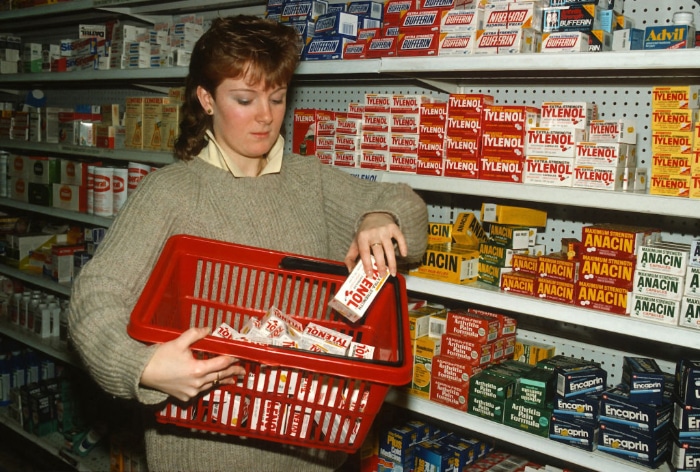By Jen Maravegias | TV | May 28, 2025

I was seven years old in 1982 when seven people in the Chicagoland area died of cyanide poisoning from tainted Extra Strength Tylenol capsules. My family was in New York, but the news and panic quickly spread across the country. Not the same way news breaks today, with a flood of social media posts from sources that need to be vetted. In 1982, we had trusted news broadcasters whom we invited into our homes every day with the morning and evening news. They were telling us to throw away all of our Tylenol products. Police in Chicago were going door-to-door to warn people to throw away the medication. Johnson & Johnson issued a nationwide recall of 31 million bottles of Tylenol capsules from stores within days of the deaths being connected to their product. It was terrifying. No one knew why, or even how, the cyanide capsules had been introduced onto store shelves. Forty-three years later, we still don’t know.
Netflix’s new three-part documentary series, Cold Case: The Tylenol Murders, spends a lot of time making the case against James Lewis. He’s been the prime suspect since 1982 based on circumstantial evidence and a history of committing credit card and identity theft. Netflix spent an entire episode deep diving into Lewis’ questionable past and possible motivation for tampering with the Tylenol products that killed a range of people, from a twelve-year-old girl home sick from school to a young mother of four. Some officials believe Lewis poisoned the Tylenol as revenge against Johnson & Johnson for manufacturing a patch that malfunctioned in his five-year-old daughter’s heart, causing her death.
But Lewis wasn’t in Chicago at the time of the murders. And no other strong suspects were ever identified. Not even in 1986, when a 23-year-old Yonkers, NY woman was killed by ingesting cyanide-tainted Tylenol, and two more contaminated bottles were found in stores.
Michelle Rosen, the daughter of one of the Chicago victims, was interviewed as part of this series. She has spent 15 years investigating these unsolved Tylenol murders. Rosen strongly believes Johnson & Johnson and McNeill (the manufacturing company owned by J&J) are responsible for negligence in the manufacturing and packaging process that introduced the cyanide. But, because the company acted so quickly to recall all of the products and conducted product testing itself, it was able to escape responsibility for the deaths caused by the tainted capsules.
Experts thought the brand was dead as soon as the Tylenol Murders happened. No one foresaw Tylenol putting products back on the shelves for a year, at least. At that point, their market share would have been in the toilet. But the company surprised everyone just a few months after the recall by bringing the product back to market with new, triple-level, tamper-proof packaging and a new ad campaign. Johnson & Johnson and the FDA worked together to develop what would become an industry standard: a box that was glued shut, a tight plastic seal around the neck of the bottle, and an inner seal made of foil that everyone still has trouble with. And, instead of capsules that could be taken apart to access the powdered medication inside, they created solid caplets.
The documentary directors didn’t want to place blame on anyone. It’s clear they were afraid to point a finger directly at Johnson & Johnson, given how little time they spent on the very valid theory that the cyanide was introduced into the product at the processing plant. The documentarians’ reluctance to point fingers rendered the series a somewhat toothless historical document. We’re used to salacious true crime stories that deliver jaw-dropping reveals.
The most shocking thing about The Tylenol Murders is how quickly the FDA and Congress acted to implement guidance and legislation aimed at preventing a similar tragedy. The FDA published regulations in November 1982 stating:
The regulations require that all OTC human drug products (except dermatologics, dentifrices, insulin, and throat lozenges) (21 CFR 211.132), cosmetic liquid oral hygiene products and vaginal products (21 CFR 700.25), and contact lens solutions and tablets used to make these solutions (21 CFR 800.12) be packaged in tamper-resistant packaging.
That same month, Strom Thurmond got the Federal Anti-Tampering Act (aka The Tylenol Bill) passed. It made it a federal offense to “maliciously cause or attempt to cause injury or death to any person, or injury to any business’s reputation, by adulterating a food, drug, cosmetic, or other products.”
The folks currently in charge of the United States government would have us believe that federal regulations are “bad” and stifle innovation. But you don’t even need to go back as far as Upton Sinclair’s *The Jungle* or Rachel Carson’s Silent Spring to understand that government regulations and oversight are, in most cases, designed to keep us safe and protect us from bad actors. Clean air, clean water, and food and drugs free from contaminants are the bare minimum we should expect in a country as wealthy as the United States. The guardrails that ensure these protections are being stripped away to benefit corporate interests like those of Johnson & Johnson.
The company insulated itself from the fallout of the Tylenol Murders by quickly positioning itself as another victim and destroying any possible evidence of additional tampering that might have implicated its production system.
Six months ago, it might have seemed unlikely that something like the Tylenol Murders could happen again. But as the current administration dismantles our regulatory bodies, that possibility becomes increasingly real.
Anyone with a special interest in true crime will want to watch this docu-series to complete their library. Everyone else may be more intrigued by the questions it raises about corporate culpability, our historical reluctance to confront it, and the urgent need to hold both corporations and the government accountable to ensure we’re protected from product tampering, whether accidental or intentional.
All three episodes of Cold Case: The Tylenol Murders are available to stream on Netflix.
